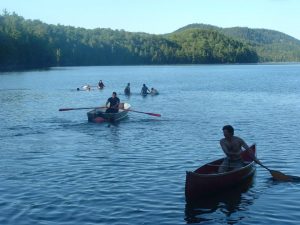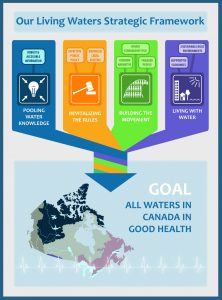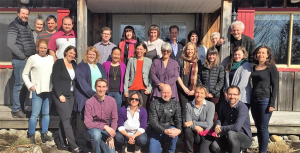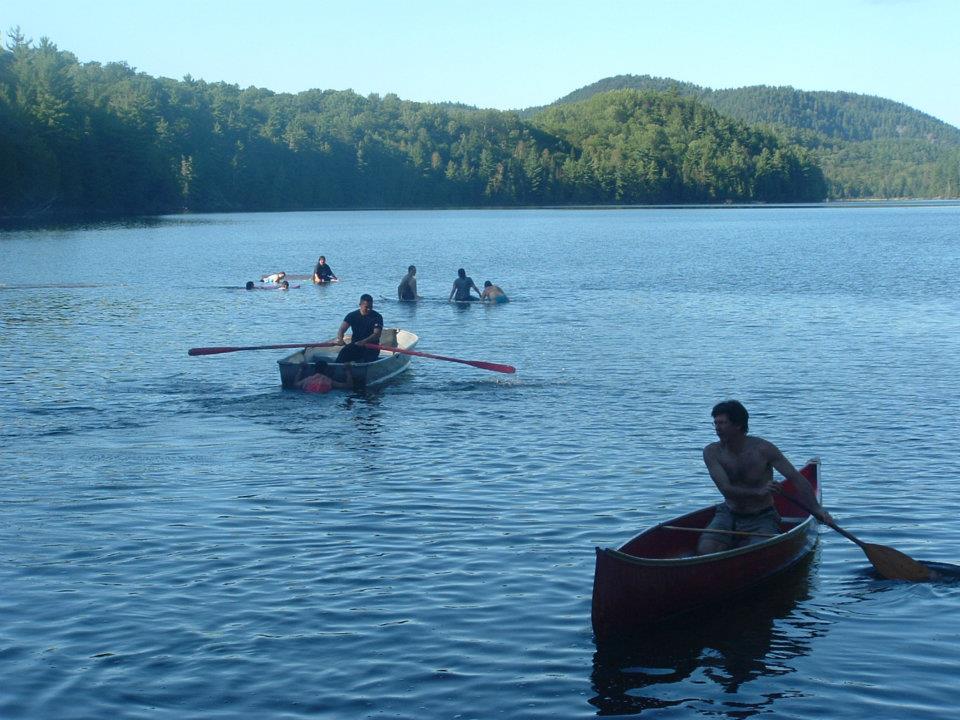 Boating, fishing, swimming… with summer around the corner, it’s safe to say many Canadians will be outdoors enjoying water-related activities across the country. Most Canadians have the privilege of access to a body of water—whether a stream, river, lake, or ocean.
Boating, fishing, swimming… with summer around the corner, it’s safe to say many Canadians will be outdoors enjoying water-related activities across the country. Most Canadians have the privilege of access to a body of water—whether a stream, river, lake, or ocean.
Royal Bank of Canada recently released their 2016 Canadian Water Attitudes Study, a poll that takes the temperature of Canadians on water issues. According to the study, freshwater is considered Canada’s most important natural resource and for the first time, climate change—think drought and flooding—was viewed as the biggest threat to sustainability.
We sat down with Wendy Cooper, Tides Canada’s Water Program Lead, to talk about why water is important now, what Tides Canada is working on, and how you can support healthy waters.
- Why is water so important to Canadians, and why is it a timely issue?
All Canadians are touched by freshwater, and we are fortunate to have a generous supply. Water is part of our identity as Canadians and we all recognize the important role in plays in a healthy environment. What needs to be more widely recognized are the growing threats to our water and opportunities to play a role in solutions that ensure healthy watersheds now and into the future. The pressure on freshwater in Canada has never been greater. There are significant impacts from climate change, large-scale industrial development, and urban infrastructure. Major changes to laws and policies in the last five years that have decreased protection of Canada’s waters are also a cause for concern. Reminders of the threats to our watersheds due to these pressures and others are visible in places like Lake Winnipeg and Lake Erie. In both lakes toxic algal blooms are affecting water quality and quantity—beaches are closed, drinking water intake systems are clogged, and the local fisheries are less healthy. These challenges and others point to the importance for all Canadians to pay attention and take steps to address these threats before the health of our watersheds declines further and affects our own health and the health of our environment.
- Can you tell us about Tides Canada’s work in water?
Tides Canada works on water at both a national and regional scale using our experience, tools, and networks to support the interests of groups on the ground and their supporters to improve the health of Canada’s water. We are co-leading initiatives at the national and regional level to invest strategically in priority activities in regions like BC, the Mackenzie Watershed, and the Great Lakes. In addition, we are proud to be the home for Our Living Waters (OLW), which is a platform uniting the freshwater community across Canada around the goal of bringing all waters into good health by 2025. The vision is for all Canadians to have access to safe freshwater for drinking, recreation, and healthy communities. This goal was endorsed by 109 delegates representing 88 organizations across Canada and OLW is building a network of funders and NGOs driving priority actions towards the shared goal.
- Why is it important to have a national network like OLW?
Over the last few decades, many organizations and individuals have focused on working to sustain and improve the health of Canada’s waters. However, what has been missing is a coordinated effort across Canada around a shared goal that aligns and tracks the progress on the strategies of these freshwater advocates. Water knows no boundaries, so how can we work in silos if we want to achieve real and lasting change? OLW was formed to address that challenge and to align and amplify the work of the many diverse organizations and individuals committed securing healthy waters across Canada. OLW coordinates action around four winning conditions that are needed to achieve the shared goal:
OLW was formed to address that challenge and to align and amplify the work of the many diverse organizations and individuals committed securing healthy waters across Canada. OLW coordinates action around four winning conditions that are needed to achieve the shared goal:
- Pooling water knowledge: Building the base of information and knowledge needed to understand, protect, and restore the health of our waters.
- Building the movement: Engaging individuals, communities, and organizations to be good stewards and care about the health of our waters.
- Revitalizing the rules: Developing an effective public policy framework as well as enforced legal systems and standards to ensure accountability.
- Living with water: Designing our communities and creating economies that work in harmony with the water cycle and watershed ecosystems.
- What is OLW doing now and what’s next?
 Recently, more than 20 water leaders from national, regional, and community NGOs and funders met in Ottawa to discuss OLW priorities and actions for the coming year. The meeting ended with a gathering on Parliament Hill attended by over 20 Members of Parliament who shared an interest in healthy waters. OLW priorities for the coming year include:
Recently, more than 20 water leaders from national, regional, and community NGOs and funders met in Ottawa to discuss OLW priorities and actions for the coming year. The meeting ended with a gathering on Parliament Hill attended by over 20 Members of Parliament who shared an interest in healthy waters. OLW priorities for the coming year include:
- Producing a scan of all the community-based monitoring (CBM) efforts across Canada to help identify gaps and work towards a CBM program in 75% of the watersheds in Canada.
- Developing a learning network and develop baseline information around transformative green infrastructure that will reduce flooding impacts in cities and local waterbodies.
- Gaining a better understanding of Canadians’ relationships and unique connection with freshwater to build a story around water to engage the public.
- Encouraging positive changes in federal water legislation, including the Fisheries Act, and working towards updating laws to reflect the current pressures on freshwater health.
Also, I’m excited to take part in the Living Waters Rally this September in Vancouver, which brings together freshwater stewards from all over Canada. Hosted by Tides Canada project Canadian Freshwater Alliance, it’s an opportunity for to celebrate, promote, connect, and strengthen work towards freshwater health across Canada. And for OLW, it is a great forum to gather input, ideas, and broaden the network.
- What can Canadians do to help?
People can either support OLW directly by donating or by connecting with their local freshwater organization to learn more about community-based efforts that they can be involved with.
Support our Healthy Watersheds program and OLW work and learn more here. You can also contact Wendy Cooper.
